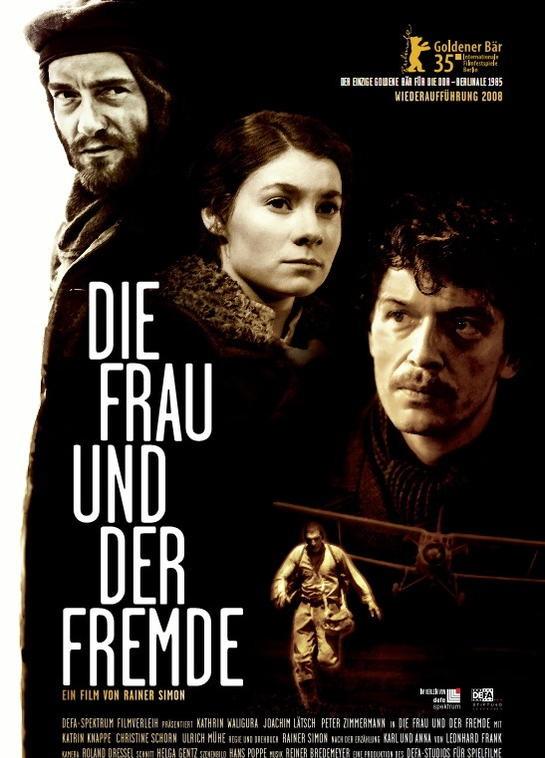Text/Du Hui
Woman and stranger Die Frau und der Fremde
Producer: GDR Released in 1985 with a rating of 7.7
The story is set in World War I, in which two German prisoners of war work hard in the heart of Russia. How wonderful it is to live, to have a lover who has been away for a long time, and to have good memories of living. In this hardship and fear of the unknown future, the two men search their stomachs and tell all the trivial things that can be remembered as normal life.
Speaking of unintentional listening intent, Carl listens to Richard's account of his wife and begins to enter an obsessive fantasy. Poor people, just want to live a normal life. In a coincidence, Richard is taken away by the Russians, while Karl takes the opportunity to escape. Karl came to Richard's house and stayed dead in Richard's name.
Although Carl knew a lot of the privacy of Richard and his wife, and although Carl imitated many of Richard's subtle habits and movements, even if he did not see his wife for several years, he would not lose his memory to think that Carl was not Richard. From the initial confusion, rejection, to hesitation to the final acceptance, and finally no matter who this person is, he still accepted the existence of this fake Richard and lived a life that normal people should enjoy together. In fact, in this era of war and chaos, who is who is important? Everyone is just an image in memory, and everyone is living. People who go to the front line, after disappearing and being captured, may end their lives, and it is more tempting to wait for an unknown answer than to accept the existence around them. Wouldn't it be better to have someone around who loves himself, can share the difficulties of life, be with each other, and give life some hope?
Karl began to settle down as Richard, and his neighbors, friends, and colleagues thought he was Richard. Time flies, the war is over, and the wife is pregnant with Karl's child, but also receives a letter from Richard. The letter confides in his love and says that he will be back soon. This made the wife, who had returned to normal life, suddenly fall into a state of anxiety and overwhelm. What should have come would come, and Richard was finally back. When Richard returned home with great joy, he found nothing out of the ordinary. Until Carl also returned home, Richard did not think much of it, thinking that his old comrades had come to visit him. Whoever thought of the dove occupying the magpie's nest, Carl became his stand-in. Finally, faced with this inexplicable situation, Carl and his wife chose to leave, and in the cold night, the two disappeared into the darkness without purpose. Richard also went from heaven to hell, thinking that the war was over, that he had come back alive, that happiness could continue, and whoever thought of a short moment of joy would have to face a cold blow, a complete despair.
That's the end of the story. The story is not complicated, the plot is not ups and downs, and the picture tells the lifeless wartime life in a dark gray tone. Everything is very depressed, and everyone has the hope of finding a little bit of survival in despair and depression. But many of the so-called hopes may not be real, and when the war is over, what was thought to be suffering may end, and the result may be another disaster.
The film is the only film in the GDR to win the Berlin Golden Bear, and although the story is only a triangular relationship life film, it is backed by profound anti-war revelations. In the war, except for the politicians and the madmen, everyone else is nothing more than a sacrifice to this ritual. In this barbaric sacrifice, in addition to taking our lives as sacrifices, we also offer all the beauty, happiness, hope, and even human personality and dignity. In the war, young and strong men were driven to the battlefield, and their lives and deaths were uncertain. Women, on the other hand, take on heavy labor and accept repressed lives in order to survive. Nevertheless, it can only be exchanged for food and rations that are barely enough to not starve. Everyone carries a heavy load, like an animal driven by fate to lead the devil's carriage.
When the war is over, the happy and normal life cannot return as scheduled, but in exchange for the young and middle-aged men who are everywhere disabled by the war, the life, human nature, family, and interpersonal relationships that have changed everything. You may be lucky enough to survive in war, but then life will give you a blow that may destroy the fire of life you have rekindled. Everything will return to darkness and despair, and every broken family, everyone's heart will be saddled with heavy burdens, heavy shackles. The knot in the heart will accompany the person's life, and it is impossible to let go, so that happiness can only exist in the memory of the war.
